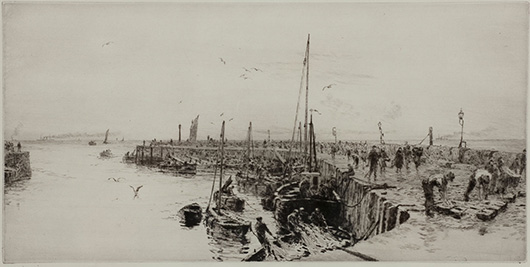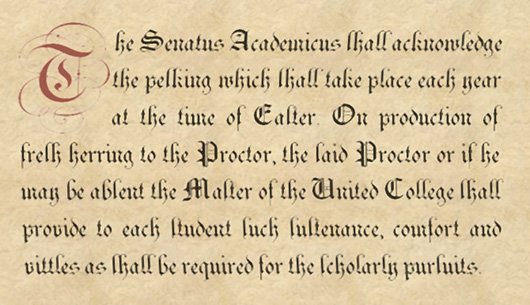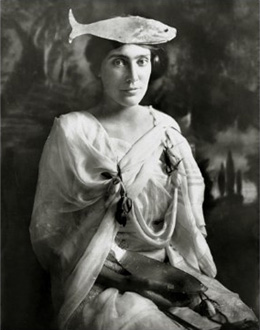Those pesky kids

Scottish Herring Fishery, believed to show students buying herring at Anstruther Harbour (William Lionel Wyllie RA 1851–1931)
A centuries-old tradition celebrating Fife’s heritage as a humble fishing community could mean that the University of St Andrews is forced to offer free “sustenance and comfort” to undergraduates who take part in a long forgotten Easter custom.
The ancient tradition of “pesking” involved students presenting themselves to the University Proctor on Easter Sunday after chapel service, having completed a traditional pier walk while carrying a fresh local herring on their heads. The Proctor was bound by university statute to then offer the pesker “..such sustenance, comfort and vittles as shall be required for the scholarly pursuits..”

Courtesy, University of St Andrews Special Collections.
Archival research carried out as part of the University’s 600th Anniversary celebrations suggests that the statute has never been repealed.
The custom of rewarding the bearers of the herring – most frequently with oats and dried fruits – derives from an old rite of Spring on the Fife coast where the womenfolk of the fishing villages would celebrate the end of Winter and the bounty of the sea by processing after church service with full baskets of fish.
“The tradition of the St Andrews Easter herring is not peculiar to Fife, but has strong links to the famous burial of the sardine ceremony in Madrid and the French tradition of giving Easter gifts in the shape of a chocolate fish,” said Dr Sandi Butt, a visiting historian from Seoul who made the discovery during studies of ancient St Andrews University statutes.
The term “pesking” appears to come from the Latin “piscis” for fish. Long and often ripe queues of St Andrews student “peskers” balancing herrings begged, bought or stolen from the local fisherfolk in the East Neuk would form outside the Proctor’s rooms in St Mary’s Quadrangle.
“Upon inspecting the herring, the Proctor would give each student a bag of raisins and oats,” continued Dr Butt.
“The high vitamin D and nutrient content of the pesking receipt seems to have been much prized by young scholars preparing for arduous exams at the end of long winters.”
University archives show that when the institution was facing financial ruin in the late 1500s, the Proctor at that time, Prof Lolia, interpreted the statute to allow him to offer moral rather physical “sustenance” to the peskers. Instead of fruit and oats, students queuing with herring were treated to a lecture on the “evils and foulness of the public houses and wicked temptations of the flesh.”
The unhappy students rioted, flinging their fish at the Deans and Masters until the Principal’s Office relented. The incident led to the creation of the first Student Services department at St Andrews.

A pesking hat worn by undergraduate Elizabeth Fortescue-Montgomery, circa 1911.
The tradition survived until the early part of last century, by which time university records show that female students had substituted fresh herring for pesking hats and headpieces of fish design, in the interests of personal hygiene.
The current Proctor, Professor Lorna Milne, said:
“I was astonished at first, but Senatus Academicus papers show ‘pesking’ was recognised by the University until the early 1900s and to the best of my knowledge the rule has never been repealed. Completion of the pesking ritual today could therefore technically entitle students to claim sustenance from the university.
“Ancient traditions have their place, but I am asking the Deans to get their skates on and have this rule repealed to avoid the spectacle of the University spending public monies on free muesli.”
The research “The St Andrews Easter Herring, the One That Got Away” is to be published on April 1st in the American Journal of Knowledge Exchange.
The tradition will be acknowledged by current St Andrews undergraduates in 2014 when the FS 2014 Fashion Show features a collection of herring-shaped hats by the Scottish-Italian couture house Alba-Core.
ENDS
Category University news